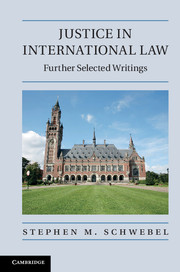Book contents
- Frontmatter
- Contents
- PART I International Court of Justice
- 1 Reflections on international adjudication
- 2 The impact of the International Court of Justice
- 3 The politics of adjudication
- 4 National judges and judges ad hoc of the International Court of Justice
- 5 The roles of the Security Council and the International Court of Justice in the application of international humanitarian law
- 6 The inter-active influence of the International Court of Justice and the International Law Commission
- 7 A site visit of the World Court
- 8 The proliferation of international tribunals: threat or promise?
- 9 The Gulf of Maine maritime boundary delimitation: the constitution of the chamber
- 10 The judgment of the International Court of Justice in the case concerning the Gabčíkovo-Nagymaros Project (Hungary/Slovakia)
- 11 Gorbachev embraces compulsory jurisdiction
- PART II International arbitration
- PART III Miscellaneous
- Collected publications, judicial opinions and book reviews
- Index
5 - The roles of the Security Council and the International Court of Justice in the application of international humanitarian law
from PART I - International Court of Justice
Published online by Cambridge University Press: 07 September 2011
- Frontmatter
- Contents
- PART I International Court of Justice
- 1 Reflections on international adjudication
- 2 The impact of the International Court of Justice
- 3 The politics of adjudication
- 4 National judges and judges ad hoc of the International Court of Justice
- 5 The roles of the Security Council and the International Court of Justice in the application of international humanitarian law
- 6 The inter-active influence of the International Court of Justice and the International Law Commission
- 7 A site visit of the World Court
- 8 The proliferation of international tribunals: threat or promise?
- 9 The Gulf of Maine maritime boundary delimitation: the constitution of the chamber
- 10 The judgment of the International Court of Justice in the case concerning the Gabčíkovo-Nagymaros Project (Hungary/Slovakia)
- 11 Gorbachev embraces compulsory jurisdiction
- PART II International arbitration
- PART III Miscellaneous
- Collected publications, judicial opinions and book reviews
- Index
Summary
I am honored to give the first Hauser Lecture on International Humanitarian Law of the New York University School of Law at the eleventh Annual Seminar for Diplomats Accredited to the United Nations co-sponsored with the International Committee of the Red Cross.
Rita and Gus Hauser are very old friends, so old that, if I were to expand on that point, my gallantry would be in question. I have long admired their contributions to legal and industrial life, Rita's work as a member of the Human Rights Commission of the United Nations and otherwise, and their public spirit, to which they lend substance through the Hauser Foundation this afternoon.
It is a particular pleasure to return to New York University Law School. It is a law school which has gone from strength to strength the last fifty years. In the sphere of international law and transactions, it has few peers. There are other leading law schools in the United States which, to their discredit, neglect international law. Yet the study of international law is no less important to the lawyer who is a citizen of the world than is the study of constitutional law to the lawyer who is a citizen of the United States. And whether we want it or not, we are all either citizens of the world or the subjects of an increasingly interdependent international system. NYU Law School has acted upon that perception for decades with outstanding success.
- Type
- Chapter
- Information
- Justice in International LawFurther Selected Writings, pp. 41 - 65Publisher: Cambridge University PressPrint publication year: 2011



